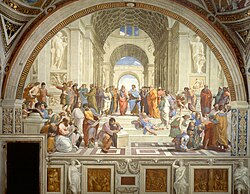| Renaissance |
|---|
 |
| Aspects |
| Regions |
| History and study |
In the history of ideas, the continuity thesis is the hypothesis that there was no radical discontinuity between the intellectual development of the Middle Ages and the developments in the Renaissance and early modern period. Thus the idea of an intellectual or scientific revolution following the Renaissance is, according to the continuity thesis, a myth. Some continuity theorists point to earlier intellectual revolutions occurring in the Middle Ages, usually referring to the European Renaissance of the 12th century[1] as a sign of continuity.
The Continuity Thesis has been seen by Paul Freedman and Gabrielle M. Spiegel as characteristic of Medieval Studies in North America in the twentieth century.[2] Despite the many points that have been brought up by proponents of the continuity thesis, however, a majority of scholars still support the traditional view of the Scientific Revolution occurring in the 16th and 17th centuries.[1][3][4][5]
- ^ a b Cite error: The named reference
Grantwas invoked but never defined (see the help page). - ^ Freedman, Paul, and Gabrielle Spiegel, 'Medievalisms Old and New: The Rediscovery of Alterity in North American Medieval Studies', American Historical Review, 103 (1998), 677–704. doi:10.1086/ahr/103.3.677.
- ^ Dear, Peter (Apr 2001). Revolutionizing the Sciences: European Knowledge and Its Ambitions, 1500-1700 (1st ed.). Princeton, New Jersey: Princeton University Press. ISBN 0-691-08859-4.
- ^ Margolis, Howard (25 Apr 2002). It Started with Copernicus: How Turning the World inside out Led to the Scientific Revolution. New York: McGraw-Hill. ISBN 0-07-138507-X.
- ^ Westfall, Richard S. (Oct 1971) [Reprint of ed. published by Wiley, New York, in series: Wiley History of Science]. The Construction of Modern Science: Mechanisms and Mechanics. Cambridge History of Science. London: Cambridge University Press (published 27 Jan 1977). ISBN 0-521-29295-6.